Puppies have a lot of hyper energy and very short attention spans.
They are also infinitely curious and want to put everything that they see in their little mouths. This can make puppy obedience training something of a challenge.
When it comes to puppy training, we want to get our puppy to repeat good behaviors, and stop bad behaviors. The more a puppy practices a behavior, the more likely she will repeat it. Therefore, by encouraging good behaviors, we ensure that she will have a good repertoire of people friendly actions to draw upon when she grows up.
Here, we deal with the 3 primary elements of puppy obedience training –
- How to communicate consistently and effectively with a puppy.
- How to encourage good puppy behaviors.
- How to discourage bad puppy behaviors.

1. How to Communicate with Puppy
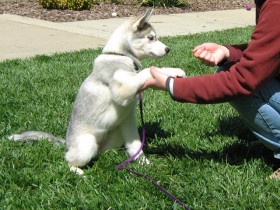
The first two words I teach my puppy are “Yes” and “No”.
“Yes” is used to mark a desirable behavior and “No” is used to mark an undesirable behavior.
Yes is usually followed by a positive consequence (e.g. a food reward, affection, toys), and No is usually followed by a negative consequence (e.g. withdrawal of attention, timeout).
In fact, we do not need to use the words “Yes” and “No”, and can pick whatever mark-words we want. The best mark-words are unique, and do not frequently come up in normal conversation. This helps to prevent confusion with our dogs.
For my dogs, I use Ack-Ack as a no-mark and Good-Boy or Good-Girl as a yes-mark.
- When my puppy does something good, I say “Good-Girl” and present her with a small treat reward.
- When my puppy does something bad, I say “Ack-Ack” and redirect her into doing something positive.
Consistency is very important while communicating with our dogs. We want to stick to the same yes-mark and no-mark.
In addition, we also want to establish very consistent rules and a fixed routine. This helps our puppy understand what is expected of her, as well as what she can expect from us.
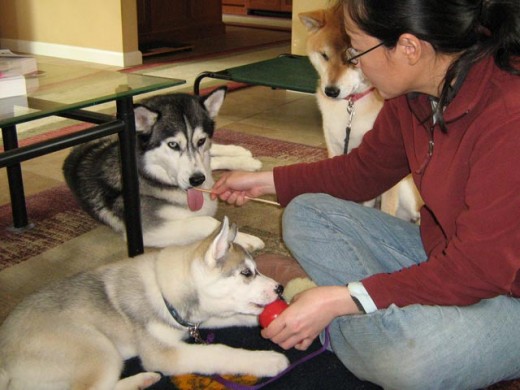

One of the first things that I do with a new puppy, is set up a fixed routine. My puppy schedule includes playing time, training time, walking time, feeding time, and the ever important sleeping time. I try to keep the schedule consistent, so that each of these activities happen at around the same time every day.
Keeping a fixed schedule is good for me, and good for Puppy. It allows me to be more efficient about getting things done, and it sets aside some me-time while Puppy is sleeping and resting in her crate.
It also helps get a puppy accustomed to a new environment, without being overly stressed. In the beginning, everything is new, foreign, and possibly scary for a new dog. A fixed schedule helps to reduce stress, increase trust, and quickly integrates her into the existing family rhythm.
Similarly, a consistent set of rules will help to avoid confusion, and hasten the puppy learning process.
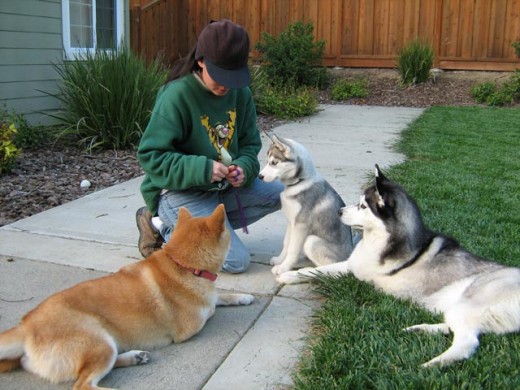
2. How to Encourage Good Behaviors
Puppy obedience training and even adult dog training is centered around two key areas-
- How to encourage and get puppy to repeat good behaviors.
- How to discourage and get puppy to stop bad behaviors.
It is important to recognize though that what we see as good and bad behaviors may not coincide with what our dog considers to be good and bad behaviors.
Dogs, even puppies, think for themselves and have needs of their own.
Therefore, we want to use our newly established communication system to teach our puppy what is good and bad for us. In addition, we must also motivate our dog so that she actually cares about our human values, which very likely, make little or no sense to her.


We encourage good behaviors by using the yes-mark, as soon as our dog finishes doing something good.
For example, when our puppy finishes doing a Sit we say “Good-Girl!” and then present her with a reward. The yes-mark is very helpful in training because it allows us to immediately mark the behavior that we want to reward.
To effectively train our puppy, we want to clearly indicate which action she is being rewarded for. If we wait too long, she will have moved on to something else, and we may inadvertently reward the wrong behavior.
Therefore, quickly use the yes-mark as soon as our dog finishes a good behavior. Then, we can take more time to present Puppy with her reward.

3. How to Stop Bad Behaviors
When it comes to stopping bad dog behaviors most of us think of applying a physical punishment, for example spanking the dog, jabbing the dog with our fingers, or giving the dog a collar correction.
These techniques apply pain to the dog, at which point the dog may stop her current behavior in order to avoid further pain and stress.
However, such pain based techniques are risky. If they are not executed with exactly the right force, timing, and redirection, they may cause more behavioral issues down the road; even aggression. It is especially risky to apply such techniques to puppies because of their young minds, and still developing bodies.
How then can we stop bad puppy behavior?

I have found that the best way to stop bad behavior is through the control of resources. *We* naturally control everything that a puppy wants, including food, toys, freedom, affection, and play.
To encourage good behaviors, we motivate our puppy by giving her something that she wants.
To discourage bad behaviors, we motivate our puppy by taking away something that she values, for example her freedom, or our attention and affection.
Note – This does not mean that we should tease our puppy and take away food while she is eating, or forcibly remove a toy that she is playing with. Doing so can encourage food aggression or resource guarding behavior.
What works best is to withhold something that my puppy wants, but does not yet have. Another possibility is to take away a privilege, such as withdrawing my attention or restricting her freedom.

When my puppy bites at my hands, I give her a no-mark (Ack-ack) and then redirect her to do something else, for example, chew on a toy. If Puppy redirects, I give her a yes-mark (Good-Girl), and reward her with something that she really wants, such as a yummy treat.
If Puppy ignores the no-mark and continues to bite at me, I withdraw my attention by standing up, folding up my arms, and turning away from her. In this way, she loses a valued play-mate, and no longer gets to engage in something fun.
If Puppy escalates her behavior and starts to jump on me or bite my clothes, I take away an even more important privilege; her freedom. I do this by calmly saying Timeout, and then taking my puppy to a boring but safe timeout area.
Puppies often bite at us to initiate play or to get our attention. We can effectively stop puppy biting by teaching her the following-
- Biting = No attention and no play,
- No biting = Attention, play, and treats.
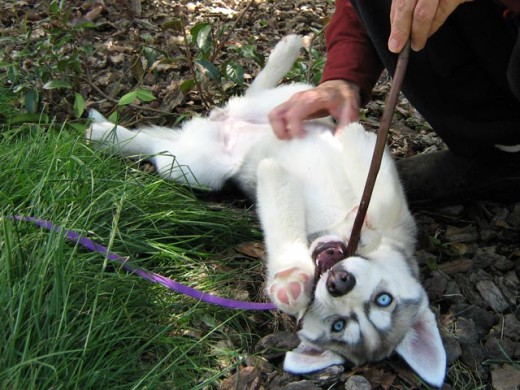
How to Train a Puppy
To stop bad behavior, I have found that it is important to –
- Start by redirecting Puppy into doing something positive. In this way, we turn a negative situation into a positive one. We not only get our dog to do what we want, but also teach her that following our commands, is the fastest way to get to her heart’s desires.
- Make the punishment suit the crime. I always start small and give my puppy many opportunities to choose a path for success. If she continues or escalates her bad behavior, then I slowly escalate her punishment.
- Stay calm at all times. Puppies have high energy and are easily distracted. If we get angry or frustrated, we will only inject more bad energy into an already volatile situation. This will likely cause our puppy to lose focus, become more hyper, and behave in an even more erratic fashion. If we want our dog to be calm, we must stay calm ourselves.
- Set Puppy up for success. Carefully manage our puppy and only expose her to situations that we think she can handle. For example, start by introducing her to new objects that are not moving, then slowly move on to moving objects, then objects that move and make noise, and so on. Start small and slowly move up to bigger things. The more successful a puppy is, the more confident she will become, and the more balanced she will be when she grows up.
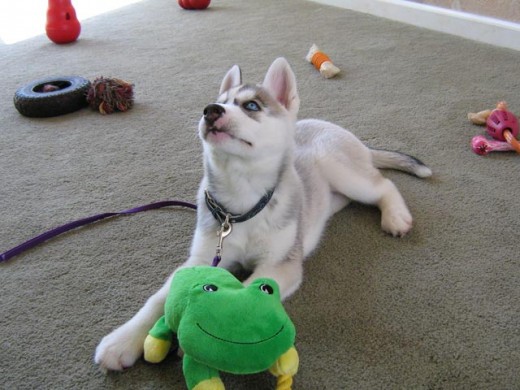
Goal of Puppy Obedience
The goal of puppy obedience is to learn how to communicate with our puppy, and teach her how to live well and harmoniously with us.
Obedience training can also help to protect our puppy from inadvertently harming herself and others, or from engaging in activities that may be detrimental to her health (e.g. over-eating, walking on glass).
Obedience training is *not* for acting out our anger, or venting our frustrations when our puppy poops on our furniture, eats poop, and spreads garbage all over our expensive designer couch.
We are not perfect, and Puppy is not perfect. In the initial stages, mistakes will be made, some of which may lead to chewed up designer shoes, scratched kitchen cabinets, and stained carpets. However, this is all part of the learning process.
Puppies, and indeed all dogs do not perform bad behaviors just to piss us off, make us angry, or exact revenge.
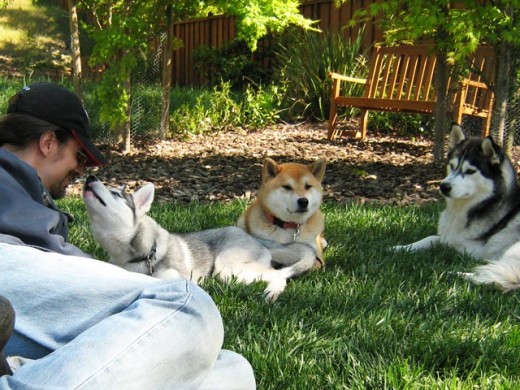
Puppies Acting Badly
Puppies or dogs act badly because …
- They do not know that something is bad because we did not teach them properly.
- They were stressed and started chewing, digging, or even pooping in order to relieve that stress (displacement behaviors).
- They felt threatened and thought it was necessary to protect themselves, or their belongings.
The key to puppy obedience training is in learning to see things from our dog’s point of view.
Once we understand what motivates our puppy, we can prevent undesirable actions and encourage desirable ones.
Dogs spend a lot of time observing us, understanding what makes us tick, and making us happy. The least that we can do, is try to return the favor.
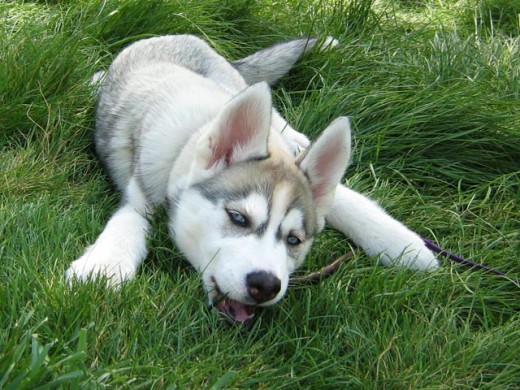
Hi! My family and I recently got a husky puppy. She is about 10 weeks old and very much still a baby. We’ve already fallen in love with her, but the problem is that she can be aggressive at times; she has bite my five-year old son in the face twice (drawing blood both times) as well as biting me on the side of the face once (also drawing blood). In none of the cases was she being provoked/eating/etc. She also growls frequently, sometimes playful, sometimes not. I’m beginning to fear that she may not be the right fit for our family (I can’t have a dog with aggressive tendencies around my child). Is there anything I can do to nip this in the bud now, before it gets even more out of hand? I’ve tried timeouts, withholding attention, etc. But nothing seems to curb the behavior. I just know that if we have to find her a new home my son will be heartbroken, but I can’t put him in potential danger as she grows much larger. Any advice would be extremely appreciated! Thank you!
Hi Katherine,
We had a husky/german sherperd puppy 2 months ago and we soon realized that we had to show her her place in the family hierarchy. (we already have a 2 years old dog) So every time we had to pass a door, it was humain first than my 2 years old dog and than my puppy. When we had to eat, we prepare every body meals (humain and dogs) and put it on the floor next to us so she could see it. We ate first than when we were done, we took there plate to there respective place to eat and let the older dog eat first and finally the puppy.
An other example, when we arrive home, we always say hi to each other first and than the older dog and finally the puppy.
She quickly realize that she wasn’t the boss and had to wait for our attention. When we play with her, we are always the one winning and always the one saying when the game start and when the game ends. She never bites us in the face but it happened that she (without control) bit our fingers and hands. We always said very loudly ”Aoutch” like if we were very heart and stopped the game there. So she could understand that she did a bad action.
Quickly her attitude changed, she was more happy to learn and listen and to obey.
I have a 8week old puppy I need help stopping him from whining and barking.He does this 24/7 we can’t have quite right a comment if you can give me a thing to do
Put your puppy in a crate and put it in the bedroom with you when you go to bed. Thats what worked for us. Now she sleeps all night and doesent make a sound. Leaving her in her crate in the kitchen resulted in her howling and whining all night and it drove us crazy.
I really need help with my puppy he barks constantly I read training stuff but I still can’t stop this Whining and barking if you can help please right a comment.
The most important thing is to not give the dog attention when it barks or whines, you have to ignore it or it will think when it barks or whines it will get what it wants. When we first got our puppy at 12 weeks she would whine all howl at night and a few nights outside in the kennel in the pouring rain fixed that but then she would start doing it again a few days later and the cycle repeated. What finally worked was putting her in her crate at night in our bedroom. She hasnt made a sound since.
Try making your puppy feel safe! What I did was out her crate in my bed and let her sleep with me or you can get on the ground eye level with a sleeping bag for a couple days to let her know she is safe and not alone.
I have a husky/lab mix, both working breed, I gotten her when she was 6 weeks old, now she is 9 months. I need some questions.
– What are some good punishments when she’s being naughty?
– How do I train her to stop jumping on people?
– I know that she likes to challenge me, a lot, whenever I try to put her in timeout, or give her kennel time, whenever I grab her collar, she likes to roll and bite my hands?
This is exactly my situation. I’ve had her since she was 5 months old and now she is 8 months old, time to start working more on our communication. She is absolutely sweet and gets along with everyone…. but she is also a real prankster. She hates the leash she just keeps on running like I am a sled and if I hold her collar she would try to bite me.
Besides that, It doesn’t matter how much I take her out or play with her, she still wants to remain independent, running away every time she can, digging and so on.
Food perks don’t help too much when trying to call her. Any advice? lol
When your dog junps on someone, tell them to stand very still. When the dog calms down. Then tell the person to pet and give attention to the dog. The dog wont learn it first time, but stay vigilant.
Dont punish your dog with anything, like time outs or kennel time. Simply dont give her attention for a minute. Its the simplest and most effective way to “punish” a dog.
And kennel time should be a safe space to sleep, or stay while you’re away for 1 hour for puppies, up to 2 hours for 6 to 12 month olds, maybe 3 hours for older dogs. Make sure you use it sparingly, apart from sleep. It should be the dogs bedroom.
Ok. i need help like now! i live aylmer quebec canada 20mins from ottawa. i have husky and… hes aggressive vicious, but also loveable. we spent some money for training and it didn’t work i’m looking for someone that would help me train my dog for free please
Hi there. This is a great article. We recently bought a 8 week old male husky and its been a roller coaster ride. I took 2 weeks off from work to help the pup settle in. However, while my wife and i are at work, we check in on him via a camera system we use. He sleeps most of the day but looks sad and lonely. While i know most recommend not to get a companion dog, is this an instance where we could look at adopting a 1 year old medium sized dog as company for him? My wife and i currently wake up at 5am daily to take him for a walk for 30 mins and play with him for 1.5 hrs before we leave for work. Then when we come home from work its another 30 min walk and lots of playing till sleep time. We are doing the best we can with our schedules, but would really like your advice.
With my first puppy, we hired a dog walker/pet sitter and we tried dog daycare after he got a bit older, and had all his vaccination shots. We also did SIRIUS puppy classes to help with his socialization. Puppy classes were very helpful for my dogs in getting them used to new people, new dogs, new situations, etc.
http://drsophiayin.com/blog/entry/puppy-socialization-stop-fear-before-it-starts
http://www.clickertraining.com/node/2184
http://shibashake.com/dog/dog-socialization-what-why-how
In my experience, getting a new dog requires even more time, supervision, and training. Even after my dogs got comfortable with each other, play can sometimes get too exciting, and I need to calm things down. I do not leave my dogs alone together unsupervised until I am very very sure that there will be no issues.
http://shibashake.com/dog/getting-a-second-dog
http://shibashake.com/dog/second-dog-introducing-a-second-dog
Hello,
My name is Isabela and I’m from Romania.
I just bought a 6weeks old husky puppy yesterday. She is really shy and scared and I wonder when she’ll stop being like this. Maybe she’s just scared because today was her first day wothout her mommy. She does not kinda like eating or drinking water and I’m really concerned about that. What treats should I give her?
Thank you very much.
Congratulations on your new Husky puppy!
When I first get a new puppy, I always take her to the vet as soon as possible. In this way, I can make sure that everything is ok, and get the vet’s advice on needed vaccinations, heart-worm prevention, etc.
In addition, it is generally best not to separate a puppy from her mother and litter-mates until she is at least 8 weeks old. Here is why.
More on how I look for good Husky breeders.
More on how I pick my dog’s food.
Some of my experiences with dog treats.
ASPCA article on puppy socialization.
Big hugs to your Husky pup!
hi, i have a 9 week old husky/malamute pup, when we first got him home he was shy and scared. but 3 weeks and 4 days on he has found his paws. he is a bouncing puppy now that is house trained and also dose a few commands e.g sit, stay, lie and paw. don’t worry you have a very cleaver puppy, she will soon come out of her shell.
good luck
🙂
This puppy looks identical to mine. I was wondering what colour it has grown to now? Also, my Ghost is constantly biting, now matter what we do, and we have tried telling her no, ignoring her, and tapping her on the nose. Nothing seems to be working. Any ideas how to sort that?
(She’s 16 weeks old, we’ve had her since eight weeks.)
Her coat is now a bit darker. Here are some recent pictures.
I deal with my puppy biting by doing three things-
1. Bite inhibition training.
2. No-bite conditioning.
3. Structure and impulse control.
I talk more about (1) and (2) here. I talk more about (3) here.
I have a 6 mo old siberian husky and I just got him almost 2 weeks ago. He is very hyper and does not like to listen very well. He also eats every toy we buy him. And find things to chew and shred at home. I have put puppy pads in the crate and he shreds and eats them. Im trying to get ahold of him and to train and manage him because I want him to be a joy to our family. I know he is just a puppy but I would like some advice on what to do. Thanks.
What is his daily routine like? How much exercise does he get? Does he only chew and shred toys when alone at home?
Note that some toys have parts that can become a choking hazard. I only leave chew-safe toys with my dogs when I am not around to supervise closely.
More on how I potty train my dog.
More on how I set up structure and teach my puppy impulse control.
How I deal with my hyper puppy.
More on how dogs learn.
ASPCA article on puppy socialization.
More articles on dog training.
Hello I just got a new husky mix. He’s name its Zeus. He’s 4 months. I have a Yorker mix he its 3 years. My husky its very shy but very sweet. And my Yorker do not want him to get near me or the area that he its. What can I do for my Yorker accept my new puppy. Also I been having trouble to walk with my husky he doesn’t like to be in a leach. I put it on when I on the back yard but when I try to walk him he doesn’t like it or pull to go back in. Help please
How big is your Yorkie mix? How is he usually with other dogs? Are there particular types of dogs that he likes? Is he afraid of larger dogs? My Huskies love to wrestle, so very close supervision is necessary, as smaller dogs can get accidentally hurt, even just in play.
More on how I help my dogs get along.
More on how I got my new dog to warm up to my other dogs.
More on how I help my puppy get used to a collar and leash.